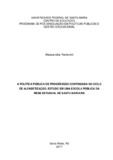| dc.creator | Venturini, Alessandra | |
| dc.date.accessioned | 2018-12-17T20:52:34Z | |
| dc.date.available | 2018-12-17T20:52:34Z | |
| dc.date.issued | 2017-08-21 | |
| dc.identifier.uri | http://repositorio.ufsm.br/handle/1/15121 | |
| dc.description.abstract | The objective of the present paper is to analyze the literacy process of the third year students of Elementary School of the Escola Estadual de Educação Básica Augusto Ruschi, located in the municipality of Santa Maria/RS, considering the system of Continued Progression in the year 2015 and the reflexes of the implementation of this Public Policy. In order to carry out this work, we opted for the quantitative-qualitative approach, with a case study, because it is the specific study of a context, a school of the state public network, using: Yin (2001), Gil (1995), Chizzotti (2006) and Ventura (2007). Initially, there were readings and reflections with authors, whose works make a historical recovery of education related to the regime of Continued Progression as a public policy and concepts of literacy, as well as, official documents: Federal Constitution (1988), LDBEN nº 9.394/96, Resolutions, Opinions, Decrees, among others that make up the legal frameworks. As data collection instruments, interviews were selected, with a script previously prepared by the researcher, with the teachers of the third years and pedagogical coordinator responsible for the Initial Years in the periods of 2015 and 2016 and application of evaluative activities in the classes of third years of Elementary School, considering this as the last year of the literacy cycle. Content analysis was used as a methodology since, according to studies by Bardin (1977), it is possible to critically analyze, in a wide way, both the speeches and the meanings of the objects that make up the said research. After analyzing the data, it is concluded that there is a discontinuity in public education policies, referring to the difficulty of implementing the legislation, including in the case presented here, mainly due to the limited resources for the creation of pedagogical support in schools, taking into account the Continued Progression. However, there is a commitment on the part of the teachers to try to fill the gaps of the students who arrive at the third years with learning difficulties and the researched school seeks the interlocution with the community in the search to meet the needs of the students. | eng |
| dc.language | por | por |
| dc.publisher | Universidade Federal de Santa Maria | por |
| dc.rights | Attribution-NonCommercial-NoDerivatives 4.0 International | * |
| dc.rights.uri | http://creativecommons.org/licenses/by-nc-nd/4.0/ | * |
| dc.subject | Políticas públicas e educação | por |
| dc.subject | Progressão continuada | por |
| dc.subject | Ensino fundamental de nove anos | por |
| dc.subject | Public policies and educations | eng |
| dc.subject | Continued progression | eng |
| dc.subject | Elementary school of nine years | eng |
| dc.title | A política pública de progressão continuada no ciclo de alfabetização: estudo em uma escola pública da rede estadual de Santa Maria/RS | por |
| dc.title.alternative | The public policy of continued progression in the literacy cycle: a study in a public school of Santa Maria/RS | eng |
| dc.type | Dissertação | por |
| dc.description.resumo | Este trabalho tem como objetivo analisar o processo de alfabetização dos alunos dos terceiros anos do Ensino Fundamental da Escola Estadual de Educação Básica Augusto Ruschi, localizada no município de Santa Maria/RS, considerando o regime de Progressão Continuada no ano de 2015 e os reflexos da implementação desta Política Pública. Para a realização desse trabalho optou-se pela abordagem quantiqualitativa, com estudo de caso, por se tratar do estudo específico de um contexto, uma escola da rede pública estadual, utilizando-se de: Yin (2001), Gil (1995), Chizzotti (2006) e Ventura (2007). Inicialmente foram realizadas leituras e reflexões com autores, cujas obras fazem uma retomada histórica da educação relacionando com o regime de Progressão Continuada como uma política pública e dos conceitos de alfabetização, bem como, documentos oficiais: Constituição Federal (1988), LDBEN nº 9.394/96, Resoluções, Pareceres, Decretos, entre outros que compõem os marcos legais. Como instrumentos de coleta de dados elegeram-se entrevistas, com roteiro previamente elaborado pela pesquisadora, com as professoras dos terceiros anos e coordenadora pedagógica responsável pelos Anos Iniciais nos anos de 2015 e 2016 e aplicação de atividades avaliativas nas turmas de terceiros anos do Ensino Fundamental, considerando esse como o último ano do ciclo de alfabetização. Utilizou-se a análise de conteúdo como metodologia já que conforme estudos de Bardin (1977) permite analisar criticamente, de forma ampla, tanto as falas como os sentidos dos objetos que constituem a referida pesquisa. Após análise dos dados, conclui-se que há descontinuidade nas políticas públicas de educação, referentes à dificuldade de implementação da legislação, inclusive no caso aqui apresentado, com a falta de recursos para a criação de apoio pedagógico nas escolas, atendendo o regime de Progressão Continuada. Porém, há um empenho por parte dos docentes em tentar suprir as lacunas dos alunos que chegam aos terceiros anos com dificuldades de aprendizagem e a escola pesquisada busca a interlocução com a comunidade na busca de atender as necessidades dos discentes. | por |
| dc.contributor.advisor1 | Mello, Débora Teixeira de | |
| dc.contributor.advisor1Lattes | http://lattes.cnpq.br/4715070196182654 | por |
| dc.contributor.referee1 | Santos, Eliane Aparecida Galvão dos | |
| dc.contributor.referee1Lattes | http://lattes.cnpq.br/7953554954853301 | por |
| dc.contributor.referee2 | Salva, Sueli | |
| dc.contributor.referee2Lattes | http://lattes.cnpq.br/8144640957398714 | por |
| dc.creator.Lattes | http://lattes.cnpq.br/5534075963149926 | por |
| dc.publisher.country | Brasil | por |
| dc.publisher.department | Educação | por |
| dc.publisher.initials | UFSM | por |
| dc.publisher.program | Programa de Pós-Graduação em Políticas Públicas e Gestão Educacional | por |
| dc.subject.cnpq | CNPQ::CIENCIAS HUMANAS::EDUCACAO | por |
| dc.publisher.unidade | Centro de Educação | por |



